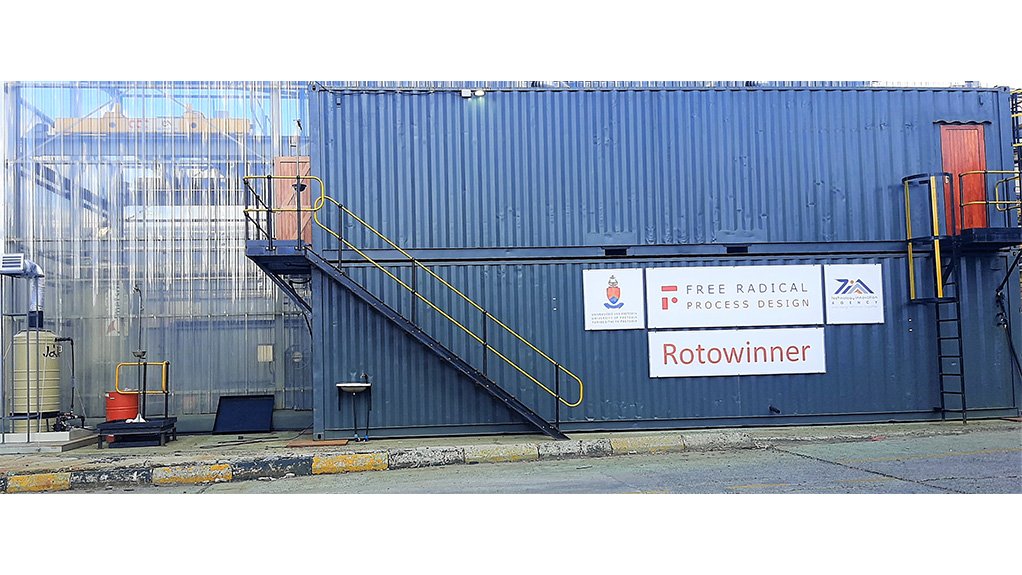The use of innovative new continuous-electrowinning technology aims to increase the production rate of electrochemically extracted metals, decrease electrical costs, and improve plant safety. The technology combines electrowinning and cathode stripping into a single continuous operation by reshaping existing parallel-plate electrodes into a rotating cylinder configuration.
South African process-engineering start-up, Free Radical Process Design, recently installed its Rotowinner containerised demonstration plant at Impala Refineries’ base metals refinery in Gauteng, noting that the industrial benchmarking exercise marks the first steps towards commercialising the novel continuous-electrowinning technology.
The continuous metal electrolysis technology was the brainchild of University of Pretoria (UP) PhD chemical engineering graduate Dr Ryno Pretorius, who is also the founder and MD of Free Radical Process Design. “The aim of this project was to produce a modular, transportable demonstration plant capable of showcasing the commercial possibility of our in-house Rotowinner technology,” he said.
The Rotowinner technology emerged from a project managed by UP and seed-funded by the Technology Innovation Agency (TIA), which is the implementing agency of South Africa’s Department of Science and Innovation. The UP Technology Transfer Office evaluated the technology for intellectual property protection and filed a provisional patent application. The company has concluded a technology licence agreement with UP to commercially exploit the technology. The TIA awarded R10-million in technology development funds for the company to construct the plant and demonstrate the technology’s economic feasibility to potential industry clients.
TIA commercialisation executive Brian Mphahlele said: “With the decline in the productive capacity of the South African economy, the country needs sufficiently differentiated innovations, such as the Rotowinner, which have enormous potential to compete on a global scale. We are also particularly pleased at the responsiveness from big business — particularly Impala Refineries — to the call to collaborate in demonstrating the commercial potential at scale.”
Impala Refineries technical manager Wilhelm Botha added: “After some initial teething problems, the demonstration plant was able to continuously produce thin strips or flaked metallic product from the plant feeds provided. Internal analysis of the products indicated it to be of similar quality to the metals currently produced in our commercial plant. The technology has the potential to produce final product on a continuous basis, on a small footprint, and with limited interaction required by operators. The basis of the technology - electrowinning of metals - gives it scope to produce various metals. We focussed on copper production specifically, as well the purification of process streams by removing the unwanted residual metals present.”
Free Radical Process Design plans to supply Rotowinner plants internationally as fit-for-purpose plants, designed to client specifications, or to offer toll-treatment options to clients who want to make use of a containerised plant for short-term beneficiation.
The company also plans to directly integrate the plant with solar photovoltaics to further enhance its remote operational possibilities and drive down the cost of production. Future developments include using the Rotowinner for continuous water-softening and metals-removal, with the aim of removing metals and hardness from mine tailings or acid mine drainage, powered by solar and producing hydrogen and oxygen as by-products.
“The technology has been developed from a bench-scale, proof-of-concept model through several iterations to become the modularised plant it is today. The plant is designed to produce approximately 30 t of copper per year. The compartments of the plant contain all equipment required to receive a leach solution from the client, maintain temperature and recirculate solution as required. Products are continuously returned to the client as a metallic slurry. Electrical and air connections are conveniently placed outside the plant, making connection and disconnection simple and fast. The plant was designed to be mobile and containerised, as the company plans to shift the plant to remote locations in Africa to beneficiate metals in remote locations. The Democratic Republic of the Congo is targeted specifically, as it is an ideal location to add value to the cobalt concentrate produced in the region,” said Free Radical Process Design project manager Maarifa Kidoge.
EMAIL THIS ARTICLE SAVE THIS ARTICLE
To subscribe email subscriptions@creamermedia.co.za or click here
To advertise email advertising@creamermedia.co.za or click here













